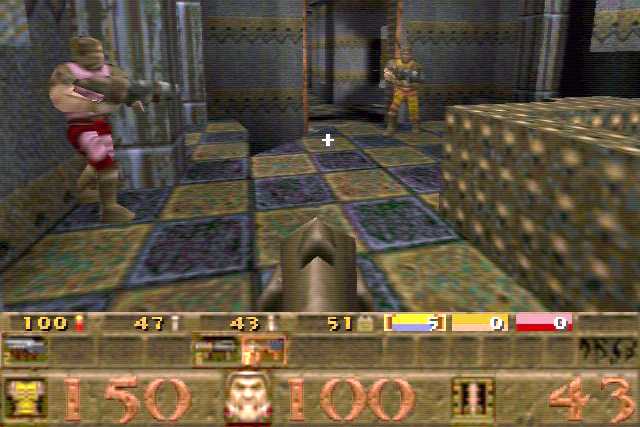
At the time of this article, the office based in Texas has 12 open slots including art supervisor, audio programmer, lead gameplay programmer, senior lighting artist, database programmer, and so on. Most of the listed jobs specifically mention Quake, saying that the company is looking for a specific individual to work as part of a development team on “legendary game properties” like Doom and Quake.
Id Software’s Germany studio is also seeking out four individuals to fill positions for audio programmer, senior engine programmer, senior physics programmer, and senior tools programmer. Two of these jobs focus primarily on the studio’s engine technology, while the other two will get their hands dirty with popular id Software properties like Doom and Quake.
If you’re looking to work for an iconic developer like id Software, now seems to be the right time to send in an application. However, if you’re wanting to hit up something like the lead gameplay programmer position, you’ll need five years of game industry experience, expert C++ coding, experience in leading a project/team of multiple programmers, excellent math skills, at least one shipped title that credits you as a programmer, and more. Needless to say, the developer doesn’t just hire anyone off the street.
Id Software released the original Quake shooter on the PC way back in 1996. It was very pivotal in the blooming first-person shooter market, ripping out flat pixels and using polygons instead, introducing the ability to look in all directions by using a mouse (mouselook), and building the foundation on which all shooters with an online multiplayer component are based on today. The game also invited players to expand on the world by creating maps, skins, and full-fledged mods.
Quake also played a major role in the birth of the graphics processor. At the time, 3DFX and Rendition were introducing the first GPUs. That led to GLQuake, which supported OpenGL, and VQuake, which supported only the Rendition Verite chip used on Creative Lab’s 3D Blaster card. The GPUs took the rendering tasks off the CPU and created amazing visuals — at that time. The blocky, grainy characters and environments were suddenly smooth and silky, thus creating a standard in PC gaming.
The 1997 sequel, Quake 2, wasn’t actually meant to be a follow-up, but a different franchise altogether. However, the studio couldn’t agree on a name, so they instead chose to stick with the Quake trademark even though the new game had nothing to do with the original installment. Thus, players are thrust into a sci-fi-themed environment rather than the gothic Lovecraft-inspired world established by Quake. This game not only added new technologies like colored lighting, but expanded on the multiplayer support for an overall better experience.
The third game in the series, Quake III Arena (1999), is a multiplayer-only title that combines the environments of both previous titles. There is no single-player campaign: players merely duke it out in a multitude of arenas against online players or bots. The fourth installment, Quake 4 (2005), wasn’t handled by id Software, but rather longtime licensing partner Raven Software. This game is a direct sequel to Quake 2 and did fairly well in reviews, as did Enemy Territory: Quake Wars, which was developed by Splash Damage in 2007. However, many fans still crave a return to the original world Quake established in the 1990s.
That said, Bethesda may be eyeing another “reboot,” as it has done with Doom. We seemingly have confirmation that another Quake title is indeed in the works, so perhaps we’ll get some kind of hint about what’s going on with the franchise during QuakeCon 2016, taking place in Dallas, Texas, in August.



